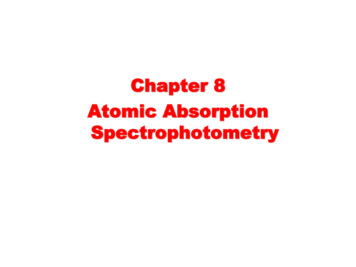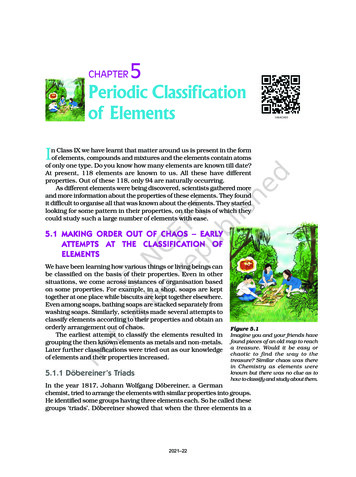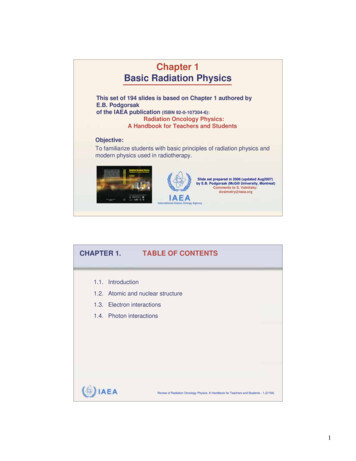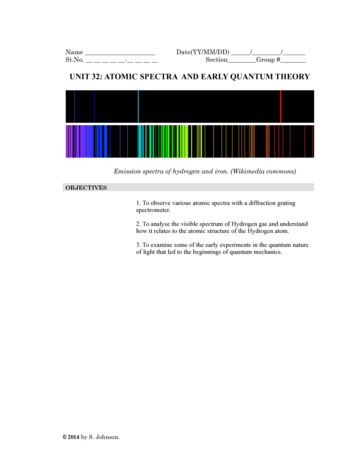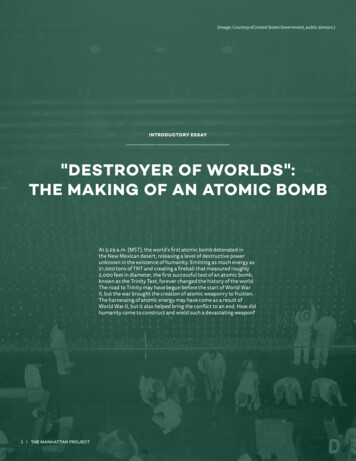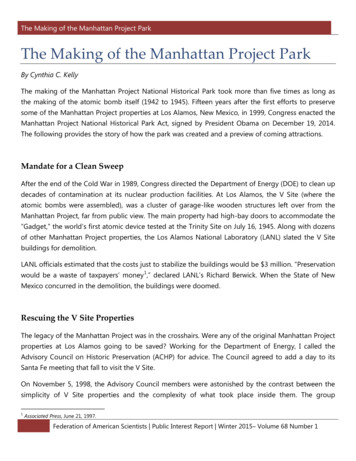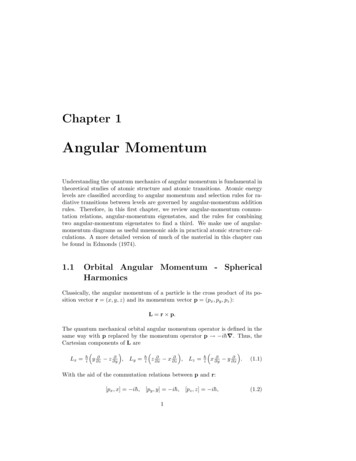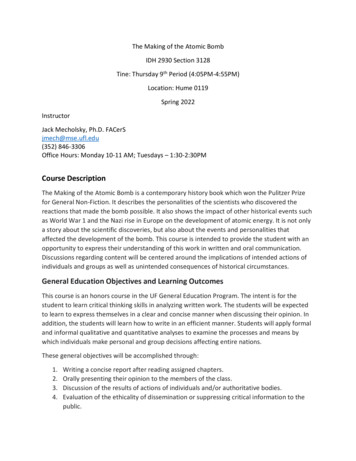
Transcription
The Making of the Atomic BombIDH 2930 Section 3128Tine: Thursday 9th Period (4:05PM-4:55PM)Location: Hume 0119Spring 2022InstructorJack Mecholsky, Ph.D. FACerSjmech@mse.ufl.edu(352) 846-3306Office Hours: Monday 10-11 AM; Tuesdays – 1:30-2:30PMCourse DescriptionThe Making of the Atomic Bomb is a contemporary history book which won the Pulitzer Prizefor General Non-Fiction. It describes the personalities of the scientists who discovered thereactions that made the bomb possible. It also shows the impact of other historical events suchas World War 1 and the Nazi rise in Europe on the development of atomic energy. It is not onlya story about the scientific discoveries, but also about the events and personalities thataffected the development of the bomb. This course is intended to provide the student with anopportunity to express their understanding of this work in written and oral communication.Discussions regarding content will be centered around the implications of intended actions ofindividuals and groups as well as unintended consequences of historical circumstances.General Education Objectives and Learning OutcomesThis course is an honors course in the UF General Education Program. The intent is for thestudent to learn critical thinking skills in analyzing written work. The students will be expectedto learn to express themselves in a clear and concise manner when discussing their opinion. Inaddition, the students will learn how to write in an efficient manner. Students will apply formaland informal qualitative and quantitative analyses to examine the processes and means bywhich individuals make personal and group decisions affecting entire nations.These general objectives will be accomplished through:1.2.3.4.Writing a concise report after reading assigned chapters.Orally presenting their opinion to the members of the class.Discussion of the results of actions of individuals and/or authoritative bodies.Evaluation of the ethicality of dissemination or suppressing critical information to thepublic.
At the end of this course, students will be expected to have achieved the following learningoutcomes in content, communication and critical thinking:Content: Students demonstrate competence in the terminology, concepts, theories andmethodologies used within the discipline. Students will acquire a basic knowledge of thescientific principles described in the work. Various social and ethical issues pertaining to thedecisions leading to the dropping of the atomic bomb will be discussed. Achievement of thislearning outcome will be assessed through written reports of the assigned readings.Communication: Students communicate knowledge, ideas and reasoning clearly and effectivelyin written and oral forms appropriate to the discipline. Students will participate in small groupdiscussions at the end of class periods during the semester with assigned groups. At the end ofthe class periods, several groups will be asked to present the points supporting their argumenton a given subject. Every group will have the chance to present, and normal class discussion willoccur during every meeting period. Achievement of this learning outcome will be assessedthrough student discussions during class time as well as during presentations of arguments onspecified topics at the end of class small group discussions. Participation grades will reflect howwell a student communicates during these tasks.Critical Thinking: Students analyze information carefully and logically from multipleperspectives, using discipline-specific methods, and develop reasoned solutions to problems.Students are expected to prepare brief written reports for each of the assigned readings. Inthree of these reports the students are expected to critically analyze the behavior andconsequences of a selected individual or organization discussed in any the assigned readings.Achievement of this learning outcome will be assessed by the identified three reports for thesemester.Required TextbookRichard Rhodes (1995). The Making of the Atomic Bomb. Simon and Schuster.ISBN: 0684813785Course ScheduleWeek 1: Introduction to courseWeek 2: Organization and InformationWeek 3: Background for nuclear reactionsRead Chapters 1-3Week 4: Discussion of Chapters 1-3Report Due on Chapters 1-3 by 5PM.Read Chapters 4-5Week 5: 20 min. presentation by Group 1Report Due on Chapters 4-5 by 5PMDiscussion of Chapters 4-5Read Chapters 6-7Week 6: 20 min. presentation by Group 2Report Due on Chapters 6-7 by 5PMDiscussion of Chapters 6-7
Read Chapters 8-9Week 7: 20 min. presentation by Group 3Report Due on Chapters 8-9 by 5PMDiscussion of Chapters 8-9Read Chapters 10-11Week 8: 20 min. presentation by Group 4Report Due on Chapters 10-11 by 5PMDiscussion of Chapters 10-11Read Chapters 12-13Week 9: Quiz on Chapters 1-11Report Due on Chapters 12-13 by 5PMDiscussion of Chapters 12-13Read Chapters 14-15Week 10: Report Due on Chapters 14-15 by 5PM20 min. presentation by Group 3Discussion of Chapters 14-15Read Chapters 16-17Week 11: No class – Spring BreakWeek 12: Report Due on Chapters 16-17by 5PM20 min. presentation by Group 4Discussion of Chapters 16-17Read Chapters 18-19Week 13: Report Due on Chapters 18-19 by 5PM20 min. presentation by Group 1Discussion of Chapters 18-19Week 14: 20 min. presentation by Group 2Report Due on Selected Chapter by 5PMWeek 15: QuizSummary and DiscussionsFinal Paper DueEvaluation of GradesAssignmentQuizzes (2)Presentations (2)Reports (10)Final PaperTotalGrading ScaleScore934-1000900-933867-899Total -89.9Percent of Grade15153040100GradeAAB Grade Points4.003.673.33
0-73.366.7-69.963.4-66.660.0-63.30-599BBC CCD DDE3.002.672.332.001.671.331.000.670.00More information on grades and grading policies is ions/info/grades.aspxClass Attendance and Make-Up PolicyClass attendance is expected. Each unexcused absence will result in a 10 point reduction in the finalgrade. Excused absences are consistent with university policies in the undergraduate lations/info/attendance.aspx) and require appropriatedocumentation.Late essay response papers will not be accepted. A makeup quiz will be provided for students who misseither quiz due to extreme, documented circumstances. A cumulative make-up quiz will be provided atthe end of the semester for any and all quizzes missed. This score will replace all missing quiz grades.Students should arrange with the instructor for makeup material, and the student will receive one week toprepare for any makeup assignment, if circumstances allow it.Students Requiring AccommodationsStudents with disabilities who experience learning barriers and would like to request academicaccommodations should connect with the disability Resource Center by arted/. It is important for students to share their accommodationletter with their instructor and discuss their access needs, as early as possible in the semester.Course EvaluationStudents are expected to provide professional and respectful feedback on the quality of instruction in thiscourse by completing course evaluations online via GatorEvals. Guidance on how to give feedback in aprofessional and respectful manner is available at gatorevals.aa.ufl.edu/students/. Students will be notifiedwhen the evaluation period opens, and can complete evaluations through the email they receive fromGatorEvals, in their Canvas course menu under GatorEvals, or via ufl.bluera.com/ufl/. Summaries ofcourse evaluation results are available to students at gatorevals.aa.ufl.edu/public-results/.Class DemeanorStudents are expected to arrive to class on time and behave in a manner that is respectful to the instructorand to fellow students. Please avoid the use of cell phones and restrict eating to outside of the classroom.Opinions held by other students should be respected in discussion, and conversations that do notcontribute to the discussion should be held at minimum, if at all.Materials and Supplies FeesThere are no additional fees for this course.
University Honesty PolicyUF students are bound by The Honor Pledge which states, “We, the members of the University of Floridacommunity, pledge to hold ourselves and our peers to the highest standards of honor and integrity byabiding by the Honor Code. On all work submitted for credit by students at the University of Florida, thefollowing pledge is either required or implied: “On my honor, I have neither given nor receivedunauthorized aid in doing this assignment.” The Honor conduct-honor-code/) specifies a number of behaviors thatare in violation of this code and the possible sanctions. Furthermore, you are obligated to report anycondition that facilitates academic misconduct to appropriate personnel. If you have any questions orconcerns, please consult with the instructor or TAs in this class.Counseling and Wellness Center Contact information for the Counseling and Wellness spx, 392-1575; and the University Police Department: 3921111 or 9-1-1 for emergencies.
Richard Rhodes (1995). The Making of the Atomic Bomb. Simon and Schuster. ISBN: 0684813785 . Course Schedule . Week 1: Introduction to course . Week 2: Organization and Information . Week 3: Background for nuclear reactions . Read Chapters 1-3 . Week 4: Discussion of Chapters 1-3 . Report Due on Chapters 1-3 by 5PM. Read Chapters 4-5




